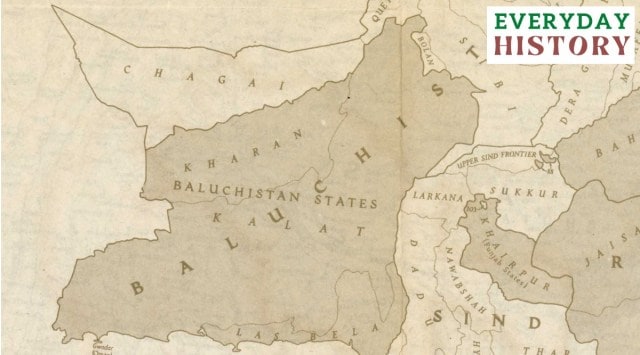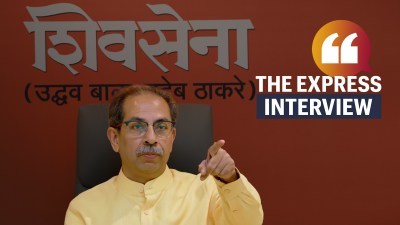- India
- International
Explained: Baloch separatism, and the coercive accession of the Khanate of Kalat to Pakistan
When the Indian subcontinent became independent, a majority of the 500-odd princely states ended up with India and among the few that decided to accede to Pakistan, those comprising the province of Balochistan proved most complicated.
 The Baluchistan region of British India, including the British Baluchistan province, the Khanate of Kalat and its subsidiary states. (National Geographic, 1946 via Wikipedia)
The Baluchistan region of British India, including the British Baluchistan province, the Khanate of Kalat and its subsidiary states. (National Geographic, 1946 via Wikipedia)
Baloch separatism has been an ongoing issue in Pakistan since the birth of the nation in 1947. The roots of the crisis go way back to the time when the Indian subcontinent became independent, and some 500-odd princely states had to be convinced to join either India or Pakistan. A majority of them ended up with India and among the few that decided to accede to Pakistan, those comprising the province of Balochistan proved most complicated. It is rumoured that the Khan of Kalat, territory at the heart of modern day Balochistan, had desired to join India, although there is no substantial evidence pointing to it. However, the province did remain an independent entity under the Khan of Kalat, well into March 1948, when the ruler, under much political pressure, signed the instrument of accession.
Balochistan before Independence
Modern day Balochistan is the largest among the four provinces in Pakistan. It is strategically located in the south western part of the country and is extremely rich in natural resources including gas, oil, copper, and gold.
Prior to Independence, the province of Balochistan was composed of a number of tribes, whose chiefs were in treaty relationships with the British.
The Khan of Kalat was the most important among these chiefs. His territories were divided among a number of feudatories with varying levels of independence. Three among them — Makran, Las bela and Kharan — had emerged as the separate political entities, who along with Kalat formed the Balochistan States Union. It was also referred to as the Khanate of Kalat or the Kalat confederacy. The British got into an agreement with the Khanate of Kalat in 1876, establishing direct rule over it. The treaty of Kalat, as it was called, formed the basis for the last Khan of Kalat, Ahmed Yar Khan, claiming independence for the territory.
The accession of the Khanate of Kalat

As the British withdrawal from India became clearer after the Second World War, the Khan of Kalat stood firm on his demand that Kalat ought to remain an independent sovereign entity. In December 1946, the prime minister of Kalat, Muhamed Aslam wrote to Lancelot Griffin, the assistant to the crown representative, recounting all the treaties concluded between the British government in India and the Kalat. It quoted Article 3 of the treaty of 1876 that bound the British government “to respect the independence of Kalat”.
Historian Dushka H Sayyid in a research paper – “The accession of Kalat: Myth and Reality” (2006) – noted that “Kalat did not feature in large in the competition between India and Pakistan for the accession of the princely states at the time of the Partition.”
“Since it was on the periphery of the Indian subcontinent, it did not hold the same importance as Kashmir or Hyderabad, or even Junagadh. Nor did it have the conflict of the ruler belonging to one faith while its population belonged to another, as both were Muslim,” he wrote.
Further, the Khan hoped that due to his close friendship with Jinnah he would be able to convince the government of Pakistan of a friendship treaty instead of accession. His demand was initially accepted and on August 11, 1947 a treaty was signed between Kalat, Pakistan and the British in which Kalat was accepted as an independent state. However, the British government was not in favour of an independent Kalat fearing Russian expansionist designs, and pressed upon Pakistan to insist upon the accession of Kalat.
The Khan, who was vehemently opposed to the idea of accession took the matter to the newly established parliament and both the House of Commons (Darul Awam) and House of Lords (Darul Ummrah) refused to accede after a prolonged debate on the matter. Ghaus Bakhsh Bizenju, who was leader of the House of Commons, noted, “We have a distinct culture like Afghanistan and Iran, and if the mere fact that we are Muslims requires us to amalgamate with Pakistan, then Afghanistan and Iran should also be amalgamated with Pakistan.”
“Granted that we have no money, but we have abundant mineral resources; we have vibrant seaports; we have unlimited sources of income. Don’t try to force us into slavery in the name of our economic compulsions.” (as quoted in ‘The rise and fall of Baloch nationalism during the British era (2022)’)
What complicated the situation though was the fact that Kharan, Las bela and Makran, the three feudatories of Kalat, wished to accede to Pakistan. The ruler of Kharan, Mir Mohammed Habibullah, wrote to Jinnah on August 21, 1947 announcing his decision to join the Pakistan union as its suzerain. In November 1947, he wrote to Jinnah, “my state will never submit to the dictates of the Kalat state and will continue to oppose any moves aimed at an interference of the state’s freedom to act”, as quoted by Sayyid.
By October 1947, Jinnah changed his mind about the independence of Kalat and demanded from the Khan to sign the instrument of accession as the other states joining Pakistan had done. When the Khan consistently refused to accede, Jinnah terminated his personal role in the matter and turned the negotiations over to the Ministry of Foreign Affairs.
Consequently, on March 17, 1948 the Pakistan government decided to accept the accession of the three feudatory states. This left Kalat landlocked and with less than half its landmass. Further pressure on the Khan was mounted when a piece of false news broke on All India Radio claiming that Kalat wanted to join India. Left with no other choice, he signed the instrument of accession on March 27, 1948.
Soon after, in July 1948, the brother of Ahmed Yar Khan, Prince Abdul Karim rebelled against the accession agreement. It was the first among the now five Baloch insurgencies. The revolt was brutally suppressed by the Pakistani forces and its leaders imprisoned. After being released, they started working for Baloch rights within the federation of Pakistan and the demand for an independent state of Balochistan.
More Explained
EXPRESS OPINION
Apr 20: Latest News
- 01
- 02
- 03
- 04
- 05








































